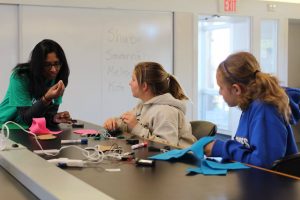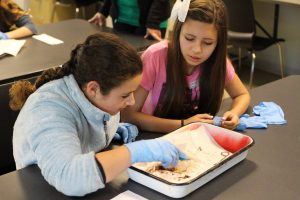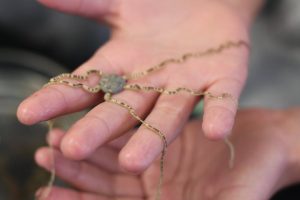GEST 2023 will take place on April 1st, 2023! Registration will open soon.
2023 Activities
Ageing in the wild: Students will learn the process of ageing various structures from marine animals. They will be able to estimate age of sea turtles and fish by counting annual growth rings within humeri bones, scales, and otoliths.
Air Quality and Alternative Energy: Design a solar array and see how much energy is needed to turn on the lights! Learn about air quality and air pollution, how different forms of energy affect the air and coastal communities and design your own energy source with a Division of Air Quality representative.
All You Need to Know about Climate Change: Tackle the basics of climate change and what we can do to help mitigate and adapt!
Food Web Collapse: Work with your group mates to build a food web out of yarn, learn how breaks in food webs effect organisms, and compete for food recources (beads) by utilizing different predation strategies.
How much tropical forest are we losing in the Amazon?: Use real-world data to calculate how much forest is being lost how quickly from different areas in the Amazon and learn how satellites are used to map forests and changes.
Invisible Forces Revealed: TBD!
Living Shoreline Exploration: Students will learn about natural based solutions for controlling erosion and polluted runoff. They will also have a chance to explore a nearby living shoreline to learn about different types of wildlife that benefit from some of these methods.
Marine Zines: Come create a mini MARINE themed magaZINE. Use supplies such as pencils, stickers, magazines, scissors, and glue to create a story. Turtles, boats, shells, and islands…what marine theme will you pick?
Ozobots: Students will learn how to instruct a robot by writing code.
Paper Circuits: Discover how current, voltage, and resistance work while building our own circuit!
Squid Squish! Squid Dissections: We will learn the biology of cephalopods through hands-on squid dissection and develop an understanding of laboratory procedures and why scientists perform dissections and necropsies.
Testing for Contaminants: Ever wonder how scientists figure out what things are in our environment that shouldn’t be? Come experiment with chromatography and learn how we test for contaminants in animals, soil, water, etc.! (and learn what a contaminant is, if you’re not sure!)
The Fresh Prints of Bel Air: Forensic Identification Methods: Learn how to lift prints off of objects such as cups or jars and examine the components of their own fingerprints (loops, whorls, ect.) using a printed guide and about newer methods of forensics using genetic fingerprinting.
Underwater Science Techniques: corals, fish, and algae…oh my!: Learn about gear needed to SCUBA dive and test out your skills in fish transect surveying, invertebrate quadrat surveying, and coral tree construction.
Water Quality Fieldwork 101: Students will collect samples of coastal water from the Duke Marine dock to compare against the water quality of tap water and learn about different water quality parameters, such as conductivity, turbidity, and dissolved oxygen.
Who’s who? Using pictures to study wild dolphins: Photo-identification is the process of using photographs of natural markings on animals to distinguish one animal from another. Students will use real data to look for dolphin matches and calculate the size of their population of dolphins in North Carolina.



